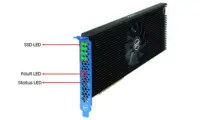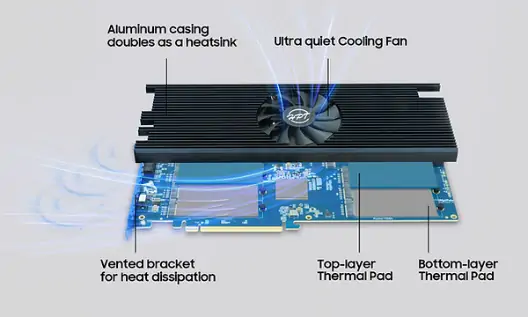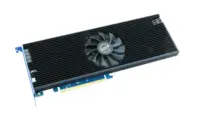(Auszug aus der Pressemitteilung)

- Innovative Hardware Design: A multi-layered hardware system combines a full-length aluminum heatsink, low-decibel cooling fan, and dual thermal pads to ensure waste heat is efficiently dissipated away from the NVMe media and sensitive controller hardware.
- Advanced Software Suite: Configurable temperature thresholds, full fan control and a selection of monitoring tools and alert mechanisms provide a proactive and customizable approach to cooling management.
- Enhanced Device Protection: By maintaining optimal temperatures, HighPoint’s cooling solutions help extend the lifespan of NVMe devices and ensure consistent performance.
NVMe SSDs generate a considerable amount of heat, especially Gen5 and Gen4 media. The ability to properly manage this waste should be a key concern of any modern high-performance server or workstation platform. NVMe media will activate a safety mechanism known as thermal throttling when temperatures cross a critical threshold. The SSD will downgrade throughput in order to mitigate heat generation and preserver hardware; hence the term “throttling” – it will throttle down performance.
This article examines the innovative ways HighPoint NVMe Rocket 7608A PCIe Gen5 x16 Pro-Class NVMe RAID AIC works to combat the threat of thermal throttling, and how this approach differs from ordinary NVMe controller cards.
The Problem of Heat Management
When aggregating storage via a dedicated NVMe AIC (add-in-card) cooling concerns can multiply. Not only must waste heat generated by the SSD media be kept in control, so to must heat generated by the AIC/Adapter’s NVMe controller ICs.
Unfortunately, the majority of NVMe PCIe cards are ill prepared in this sense – most have only basic cooling hardware (a simple fan or heat sink, for example). Ordinary NVMe PCIe add-in-cards tend to rely on the host platform’s internal cooling system. This approach is at odds with the needs of professional server and workstation platforms. The internal cooling systems are generally stressed enough as is; the average platform must deal with the host CPU, motherboard and power supply, in addition to an assortment of other PCIe devices, ranging from networking controllers and expansion cards, to high-speed GPU’s. Adding an ordinary NVMe controller to the mix may be asking for trouble.
HighPoint’s Intelligent Pro-Active PCIe Gen5 Cooling Solutions: Leveraging State of the Art Hardware and Innovative Software to Combat Thermal Throttling
HighPoint understands how critical heat management is for modern high-performance computing platforms. It is key to maintaining long-term durability and performance potential of any given system. Our NVMe solutions have always been built with these requirements in mind, and challenge performance-robbing thermal throttling head on.
To coincide with the release of our PCIe Gen5 NVMe storage solutions, we have introduced a groundbreaking approach to NVMe thermal management. Our next-generation Rocket 7608A PCIe Gen5 x16 Pro-Class NVMe RAID AIC is a true standout in this regard. Unlike ordinary NVMe controller cards, the solution pairs the industry’s most advanced hardware cooling systems with a powerful software suite designed enhance the reliability of NVMe media and maximize storage performance by keeping the threat of performance -robbing thermal throttling at bay.
The Hardware Side
Rocket 7600 series Pro-Class NVMe RAID AICs employ the latest generation of our proven NVMe hardware cooling solutions. The system is to our product lines, and isn’t simply a mish-mash of standardized componentry.
Key Features:
- Multi-Layered Cooling System:
- Aluminum Heatsink: The robust aluminum heatsink covers the entire length of the NVMe device, maximizing the surface area for heat dissipation
- Durable, Low-Decibel Cooling Fan: A powerful, low-noise fan is integrated directly into the heatsink for maximum efficiency
- Dual-Cooling Padding: By providing cooling from both the top and bottom, the dual-cooling padding ensures that all heat generated by the NVMe device is effectively managed
- Integrated Notification & Alert System: An audible alarm and series of LED indicators enable administrators to instantly asses potential heat-related issues in the field
Multi-Layered Cooling System
The Rocket 7608A employs a full-length aluminum heatsink with copper SSD contacts, two layers of thermal padding and a powerful low-decibel cooling fan. This innovative, layered approach ensures that the hosted M.2 media is able to operate within the manufacturers specified temperature threshold, even under maximum sustained load.




Neueste Kommentare
15. Juli 2025
15. Juli 2025
13. Juli 2025
8. Juli 2025
7. Juli 2025
5. Juli 2025